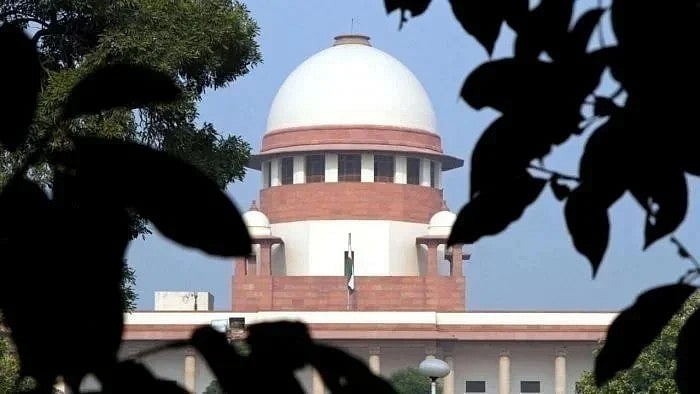
The Supreme Court of India.
Credit: PTI File Photo
New Delhi: The Supreme Court on Tuesday asked if the Governor’s independent power to withhold a Bill is recognised, then a money Bill can also be straightaway withheld by the constitutional functionary.
A five-judge bench of Chief Justice of India B R Gavai and Justices Surya Kant, Vikram Nath, P S Narasimha, and A S Chandurkar, said the Centre's contention is a little problematic because at the threshold, if the Governor withholds the Bill; even textually, there is a problem because if that is the power, then even a money Bill can be withheld.
The court was hearing submissions on the presidential reference, which raised constitutional questions on whether the court can impose timelines for Governors and the President to deal with Bills passed by state assemblies.
The bench pointed out that the proviso to Article 200 says that, except in the case of a money Bill, a Governor can return the Bill to the assembly for reconsideration.
The court said if the Governor’s independent power to withhold a Bill is recognised, then "a money Bill can also be straightaway withheld... he can stop a money bill?"
Senior advocate Harish Salve, representing the Maharashtra government, replied that he can. The counsel maintained the Governor’s power to withhold a Bill is not available for judicial review.
Salve contended that if the court held that the Governor has no right to withhold his assent on the Bills on the reading of Article 200 (of the Constitution) that is another matter.
“That is delineating the power. But the moment it is accepted that he had a right to withhold. Then his declaration in a particular case of withholding is available to judicial review. My respectful answer is no," he said.
He said, “Now, why do I say this? First of all, when we discuss justiciability, we need to define justiciability of what? If there is a power and that power is accepted to be high discretion vested in a high constitutional functionary. Is there any scope left for judicial review of that particular power? Each power and each exercise of power and each nature of function will have to be tested by itself."
He argued that if the power says that the high functionary is satisfied, then the court is entitled to make sure that the high functionary is satisfied.
“If the constitutional provision does not expressly create any such condition for exercise of power, the court cannot read in a precondition and then create the (condition)… if a constitutional provision says, if you are satisfied that there is a breakdown of law and order, whether or not that test is satisfied. May be a matter which may give a narrow sliver of area of judicial review," he contended.
Referring to Article 200, he said, it gives no indication when he should withhold, when he should assent, when should he reserve it for the president, or when should he send it back?
"So, there is no judicially manageable standard by which the court can test whether he has rightly exercised that… Did he have to fulfil any condition before exercising the power? The answer is no. That is the important point on justiciability," Salve argued.
Salve said the scheme of Article 200 leaves no manner of doubt that the founding fathers did not intend to make the referral of a Bill to the house with a message a necessary consequence of withholding assent.
“The obvious reason for not doing so was whether the Governor withholds the assent, and the circumstances of another sharp political division. And in the opinion, the Governor, the bill should not be allowed to become law… There may be cases like this. Needless to add, this is a far-reaching power. And, if it is likened to a veto, it only means that the founding fathers wanted to reserve a veto," he submitted.
Salve also maintained that assent to a law cannot be given by a court.
“Assent to a law has to be given either by the Governor or by the President… the power of the court under Article 142 is to do complete justice. It cannot expand the power of the court to grant assent to legislation… Now, if you cannot follow that formula… that in 142 we will grant the assent, you must have the Governor. Who told you to tell that no send this to the President, do this, do that,'' Salve contended.
Salve said there is a complete absence of judicially manageable standards. The bar under Article 361 creates a situation where you can not ask him to explain why he did what he did. Nor can you direct him to do what you think is right."
During the hearing, the bench asked senior advocate Neeraj Kishan Kaul, who represented the Madhya Pradesh government, if the Governor sits on Bills from 2020 to 2025, should the court sit powerless? Kaul replied that if there is egregious conduct on the part of the Governor, then the Parliament is the best placed to take care of it, and it has been said in the apex court’s judgments.
In May, President Droupadi Murmu exercised powers under Article 143(1) to know from the top court whether timelines could be imposed by judicial orders for the exercise of discretion by the president while dealing with the bills passed by state assemblies.
In April, 2025, a two-judge bench had invoked the power under Article 142 of the Constitution, to declare the deeming of assent to the ten Bills passed by the Tamil Nadu Assembly and kept pending by the Governor.
